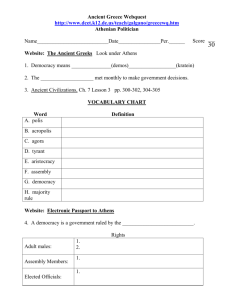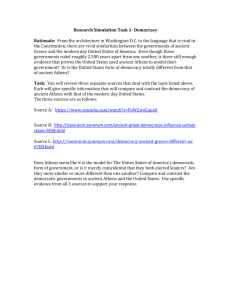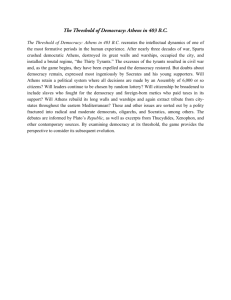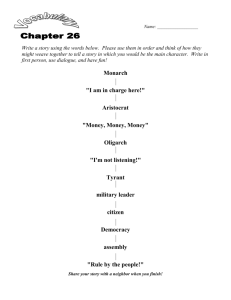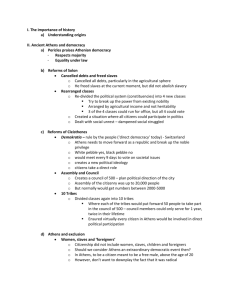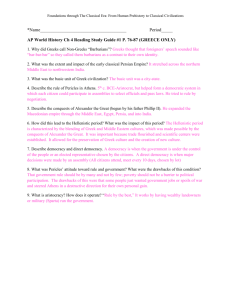Compare and Contrast: Democracy
advertisement
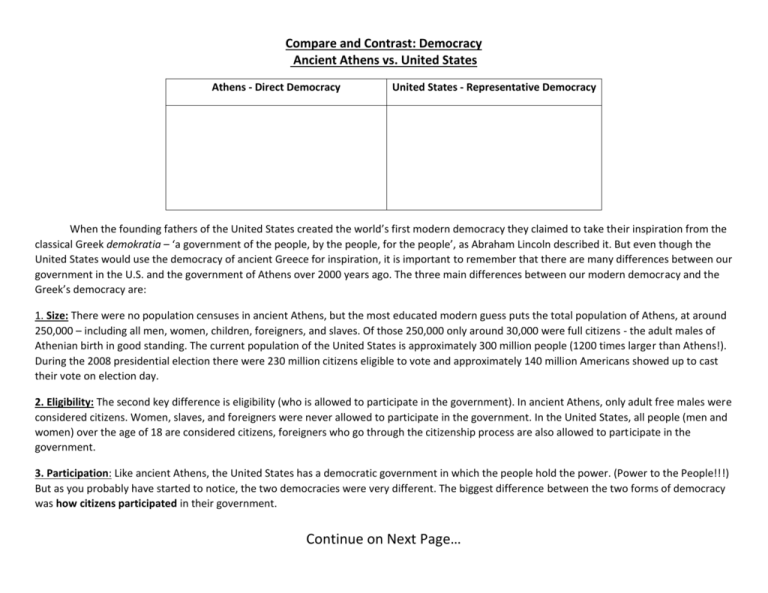
Compare and Contrast: Democracy Ancient Athens vs. United States Athens - Direct Democracy United States - Representative Democracy When the founding fathers of the United States created the world’s first modern democracy they claimed to take their inspiration from the classical Greek demokratia – ‘a government of the people, by the people, for the people’, as Abraham Lincoln described it. But even though the United States would use the democracy of ancient Greece for inspiration, it is important to remember that there are many differences between our government in the U.S. and the government of Athens over 2000 years ago. The three main differences between our modern democracy and the Greek’s democracy are: 1. Size: There were no population censuses in ancient Athens, but the most educated modern guess puts the total population of Athens, at around 250,000 – including all men, women, children, foreigners, and slaves. Of those 250,000 only around 30,000 were full citizens - the adult males of Athenian birth in good standing. The current population of the United States is approximately 300 million people (1200 times larger than Athens!). During the 2008 presidential election there were 230 million citizens eligible to vote and approximately 140 million Americans showed up to cast their vote on election day. 2. Eligibility: The second key difference is eligibility (who is allowed to participate in the government). In ancient Athens, only adult free males were considered citizens. Women, slaves, and foreigners were never allowed to participate in the government. In the United States, all people (men and women) over the age of 18 are considered citizens, foreigners who go through the citizenship process are also allowed to participate in the government. 3. Participation: Like ancient Athens, the United States has a democratic government in which the people hold the power. (Power to the People!!!) But as you probably have started to notice, the two democracies were very different. The biggest difference between the two forms of democracy was how citizens participated in their government. Continue on Next Page… Athens : Direct Democracy United States: Representative Democracy Athenian democracy was direct and in-your-face. All citizens gathered together (usually on an outdoor hillside) to argue, debate, and ask questions before they all voted on an issue. Each person had an equal say (one vote) in what the government would do. There was no “separation of government” or elected officials. The citizens of Athens used a simple majority (most votes wins) to decided what to do. The citizens directly created new laws, acted as judges, decided when to go to war, and who to make alliances with. When there were not enough people to make a decision, slaves were sent out to force citizens to show up and vote. The United States uses a representative form of democracy. In this system, the citizens go and vote for people to represent them in the government. In this way, we chose who we want to speak for us in the government and who we want to make our decisions for us. In the U.S. we choose many different representatives; president, senators, congressmen, governors, judges, and mayors. In a representative government the people have the power to choose who makes their decisions but usually do not have the power to vote on individual issues like new laws and when to go to war. Our government is also divided up into 3 branches, and each branch has a different job. Continue on Next Page… _____________________________ __________________________ __________________________ Conclusion:…………………………………………………………………………………………………… ……………………………………………………………………………………………………………………… ……………………………………………………………………………………………………………………… ……………………………………………………………………………………………………………………… ………………………………………………………………………………………………………………………
